Renal Transplants at Marengo CIMS Hospital: A Comprehensive Approach to Kidney Care
Marengo CIMS Hospital in Ahmedabad is renowned for its excellence in the field of renal transplants. Our Kidney Transplant Program offers cutting-edge treatments, advanced surgical techniques, and comprehensive care for patients suffering from chronic kidney disease or renal failure. With a dedicated team of expert nephrologists, transplant surgeons, anesthetists, and post-transplant care specialists, we ensure that every patient receives personalized, world-class care at every step of their transplant journey.
What is a Renal (Kidney) Transplant?
A renal transplant is a medical procedure in which a healthy kidney from a living or deceased donor is surgically placed into a patient whose kidneys have failed or are no longer functioning properly. The kidneys are responsible for filtering waste and excess fluids from the body, and when they stop working, a person may experience renal failure, which can lead to life-threatening complications.
Kidney transplant is considered the most effective treatment for end-stage kidney disease (ESKD) compared to dialysis, as it offers a higher quality of life, better long-term survival, and the ability to live without the restrictions that dialysis often imposes.
Why Do People Need Kidney Transplants?
The most common reasons for kidney failure, which may require a transplant, include:
- Chronic Kidney Disease (CKD): Often caused by diabetes, high blood pressure, and glomerulonephritis.
- Polycystic Kidney Disease (PKD): A genetic condition in which cysts grow in the kidneys and impair their function.
- Acute Kidney Injury: Severe kidney damage due to infection, trauma, or dehydration.
- Genetic or Congenital Abnormalities: Conditions like obstructed kidneys or underdeveloped kidneys that impair their ability to function.
- End-Stage Renal Disease (ESRD): When kidneys can no longer perform their basic functions, dialysis or a kidney transplant is needed.
If a person’s kidneys are no longer able to filter the blood effectively, dialysis is often used to perform the filtering function temporarily. However, kidney transplants offer a more permanent solution with better long-term outcomes.
Kidney Transplant Process at Marengo CIMS Hospital
At Marengo CIMS Hospital, our Renal Transplant Program follows a comprehensive approach from the initial assessment through post-surgery recovery and long-term care. Here is an overview of the process:
1. Pre-Transplant Evaluation
The first step in the transplant process is a thorough evaluation. Our team of nephrologists, transplant surgeons, and other specialists will evaluate the patient’s overall health to determine whether they are a suitable candidate for a kidney transplant. This evaluation includes:
- Medical History and Physical Examination: A detailed review of the patient’s health, including any underlying conditions such as diabetes, hypertension, or heart disease.
- Blood Tests: To check kidney function, assess compatibility, and detect potential infections or other issues.
- Imaging: To evaluate the kidneys and other organs for any structural problems.
- Psychosocial Assessment: To assess the patient’s mental health and readiness for the transplant process.
- Compatibility Testing: This includes HLA (human leukocyte antigen) and blood type matching to ensure compatibility between the recipient and donor.
2. Choosing a Donor
Once the evaluation is complete and the patient is deemed suitable for a transplant, we move to the next step: finding a compatible donor. There are two types of kidney donors:
- Living Donors: A family member, friend, or a willing volunteer who donates one of their kidneys. Living donations are often preferred because the transplanted kidney typically functions better and lasts longer than a kidney from a deceased donor.
- Deceased Donors: In cases where a living donor is not available, kidneys from recently deceased individuals are used. These kidneys are typically harvested and preserved for transplant.
At Marengo CIMS Hospital, we ensure that all living donations are carefully matched and that the donor’s health and safety are prioritized throughout the process.
3. Kidney Transplant Surgery
The kidney transplant surgery itself is a complex but highly refined procedure. At Marengo CIMS Hospital, our expert renal transplant surgeons use state-of-the-art techniques to perform the transplant:
- The donor kidney is surgically placed into the recipient’s body, usually in the lower abdomen.
- The surgeon connects the kidney to the recipient’s blood vessels and urinary tract.
- The new kidney is closely monitored during the surgery to ensure proper function and connection.
Post-surgery, the patient is closely monitored in the hospital for signs of rejection, infection, or complications. We use a multi-disciplinary approach to ensure the highest level of care during the immediate post-surgical period.
4. Post-Transplant Care and Recovery
The period immediately following the kidney transplant is critical. At Marengo CIMS Hospital, we provide comprehensive post-transplant care, which includes:
- Immunosuppressive Medications: To prevent organ rejection, patients are prescribed medications that suppress the immune system. These medications need to be taken for the rest of their lives.
- Monitoring for Organ Rejection: Regular check-ups, blood tests, and kidney function tests are done to detect signs of rejection.
- Infection Control: Immunosuppressive medications make patients more susceptible to infections, so we focus on infection prevention and early detection.
- Nutritional Support: Proper nutrition is vital for recovery, and we provide customized nutritional plans to help patients regain strength and promote healing.
- Physical Rehabilitation: Gradual return to physical activity and strength-building exercises is important for long-term health and well-being.
- Psychosocial Support: Emotional and psychological support for patients and their families is provided to help them adjust to life after transplant.
The first few months following the transplant are the most critical for monitoring the patient’s recovery and ensuring that the transplanted kidney is functioning properly. Regular follow-up visits and monitoring are required to ensure the long-term success of the transplant.
5. Long-Term Care and Monitoring
After the initial recovery period, patients are generally able to return to a normal lifestyle. However, long-term care is essential to ensure the health of the transplanted kidney and the patient’s overall well-being. Our renal transplant team continues to monitor:
- Kidney Function: Regular blood tests, urine tests, and imaging studies are done to ensure the kidney is functioning optimally.
- Immunosuppressive Therapy: Patients must adhere to a strict regimen of medications to prevent organ rejection. Our team closely monitors the medication’s effects and adjusts dosages when necessary.
- Preventive Care: We focus on preventing complications such as high blood pressure, diabetes, and infections, which can affect the transplanted kidney.
Our goal is to help transplant recipients lead a healthy, active life with their new kidney, and we provide ongoing support through regular follow-ups, lifestyle counseling, and emotional support.
Key Features of Renal Transplant at Marengo CIMS Hospital
- Comprehensive Care: From pre-transplant evaluation to long-term post-transplant care, we provide a holistic, patient-centered approach to kidney transplant.
- State-of-the-Art Surgical Techniques: Our experienced transplant surgeons use the latest minimally invasive techniques to ensure successful outcomes and faster recovery times.
- Multidisciplinary Team: Our transplant team includes nephrologists, transplant surgeons, anesthesiologists, dieticians, psychologists, and nursing staff, all working together to provide personalized care.
- Advanced Immunosuppressive Management: We closely monitor and adjust immunosuppressive therapy to reduce the risk of rejection while minimizing side effects.
- Patient Education and Support: We ensure that patients and their families are well-informed about the transplant process and provide ongoing support for a smooth recovery.
Success Rate and Outcomes
Marengo CIMS Hospital has an excellent track record for successful kidney transplants, with high patient survival rates and long-term kidney function. The combination of advanced medical technology, expert surgical care, and personalized post-transplant monitoring has made us one of the leading centers for renal transplants in Gujarat and India.
At Marengo CIMS Hospital, our Kidney Transplant Program is designed to offer life-changing treatment for patients suffering from end-stage renal disease. Our experienced team of transplant specialists, state-of-the-art technology, and commitment to patient care ensure that every patient receives the highest standard of care. If you or a loved one is considering a kidney transplant, we are here to guide you through the process and provide the support needed for a successful recovery. With Marengo CIMS Hospital, a new lease on life is just a transplant away.
Renal Transplant
What is Nephrology?
Human body has two kidneys located in the back side. Kidneys’ function is to purify the blood and to remove toxins from blood. Nephron is basic structural and functional unit of kidney. Nephrology is a science that deals with disorders of kidney.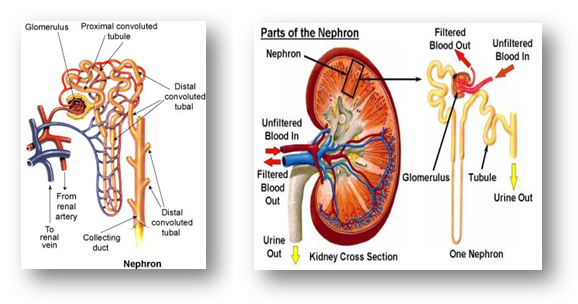
Kidney stones
Please refer Urology webpage
Dialysis
When kidney function drops below minimum requirement to sustain body and maintain normal parameters, the solution is to replace the kidney function with either another artificial technology or transplant of healthy kidney.
Purification of blood via artificial means is called “Dialysis”.
Type of Dialysis: 1. Hemodialysis 2. Peritoneal Dialysis
Hemodialysis
- In this method, blood is purified through a machine known as “hemodialyser”. Blood flows through a dialyser and is returned to the body after purification.
- Hemodialysis requires AV-Fistula or dialysis catheter. Dialysis catheter could be of short term or long term duration.
- Hemodialysis should be performed twice or thrice a week as per advice by nephrologist for patients whose kidneys are permanently impaired.
- Hemodialysis is also required and performed in patients having severe but temporary reduction in kidney function.
- It can be performed at hospital only under observation of skilled nephrologists and technical staff.
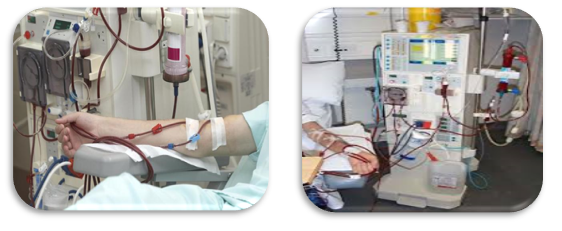
Peritoneal Dialysis
- Peritoneal dialysis is another modality for dialysis, which is equally effective as haemodialysis.
- Peritoneal dialysis, which is done as a long term therapy for the patient having permanent loss of renal function is called Continuous Ambulatory Peritoneal Dialysis (CAPD).
- In this process, a rubber tube is inserted in the abdomen and fixed there.
- A peritoneal dialysis solution is infused through tube 3-4 times a day as per advised by a nephrologist.
- The solution remains in abdomen for about 4 hours, removes toxin from blood and after 4 hours, dialysis solution with toxin inside is drained out of abdomen.
- Infusion and draining of peritoneal fluid should be done for 3-4 times a day.
- It is extremely useful in patients without vascular access (AV fistula or long term dialysis catheter).
- It is not suitable for patients who have undergone multiple abdominal surgeries.
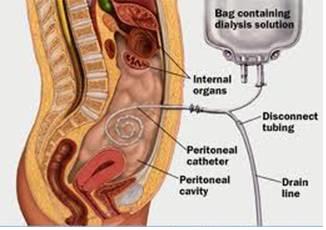
Marengo CIMS Hospital has 6 dialysis workstations and has performed 3322 haemodialysis procedures including 1895(OPD) and 1427(IPD) in the last year (2014).
Renal Transplant
- Renal Transplant (RT) is the best possible option for patient suffering from End-Stage-Renal-Disease. Legally, near relative that include (father-mother, grandfather-grandmother, brother-sister, son-daughter, grandson-granddaughter and husband-wife) can donate kidneys to one another.
- Such transplant is called “live related renal transplantation”.
- For patients who don’t have well-matched relative for donation can opt for deceased/ cadaveric renal transplantation. In deceased donor/cadaveric renal transplantation, kidneys are harvested from brain-dead donors and implanted in recipients.
- The 3rd option for Renal Transplant is swap RT for unrelated patients.
- Renal Transplant requires extensive work-up for both recipients and donors before transplantation.
- Patients need to continue necessary medications for rest of his/her life to ensure proper kidney graft function.
- They require lifetime follow-up with nephrologist.
- Under a Renal Transplant operation, new kidney allograft is placed in right lower abdomen without removing original kidney.
Marengo CIMS Hospital Kidney Transplant Center
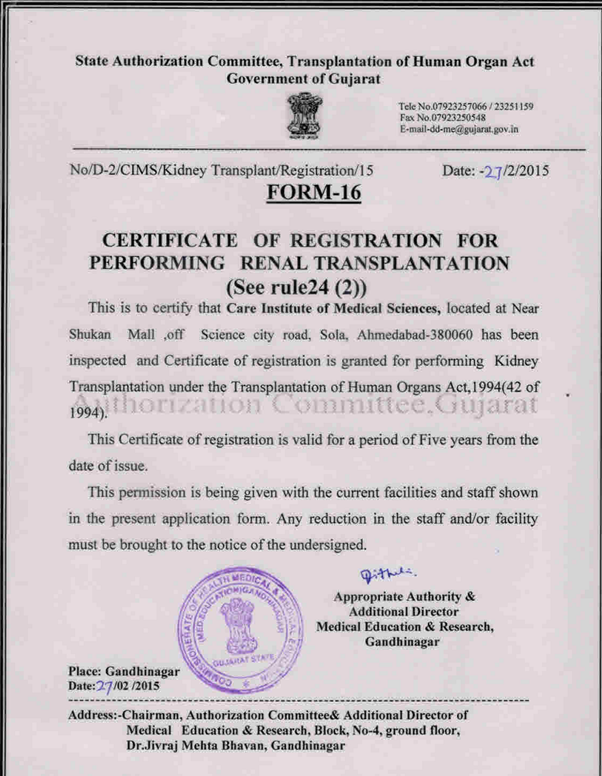
We are well-equipped with all necessary resources for a successful renal transplantation which include but not limited to:
- Highly experienced and qualified team of doctors
- Renal transplant programme co-ordinator for counselling sessions for patient and relatives
- Renal Transplant Committee constituted by subject matter experts and key opinion leaders for transparent, non-objectionable ethical review
- Best infection control practices while harvesting kidney to be transplanted and also throughout the procedure.
- Renal transplant ICU.
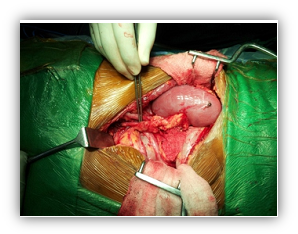

Contact Us
Toll Free Number : 1800 309 9999
Medical Helpline +91 70 69 00 00 00
Phone: 079 4805 1200 or 1008
+91 79 2771 2771 or 72
Ambulance: +91 98244 50000
Email: info@cims.org | opd.rec@marengoasia.com | marengocims.info@marengoasia.com
Location
Marengo Asia Healthcare Private Limited
CIN Number - U85100GJ2020PTC131504
Plot No. 67/1, Opp. Panchamrut Bunglows, Nr. Shukan Mall, Off Science City Road, Sola, Ahmedabad – 380 060
In case of any patient safety or quality-of-care related concern, please contact to JCI by clicking here.

